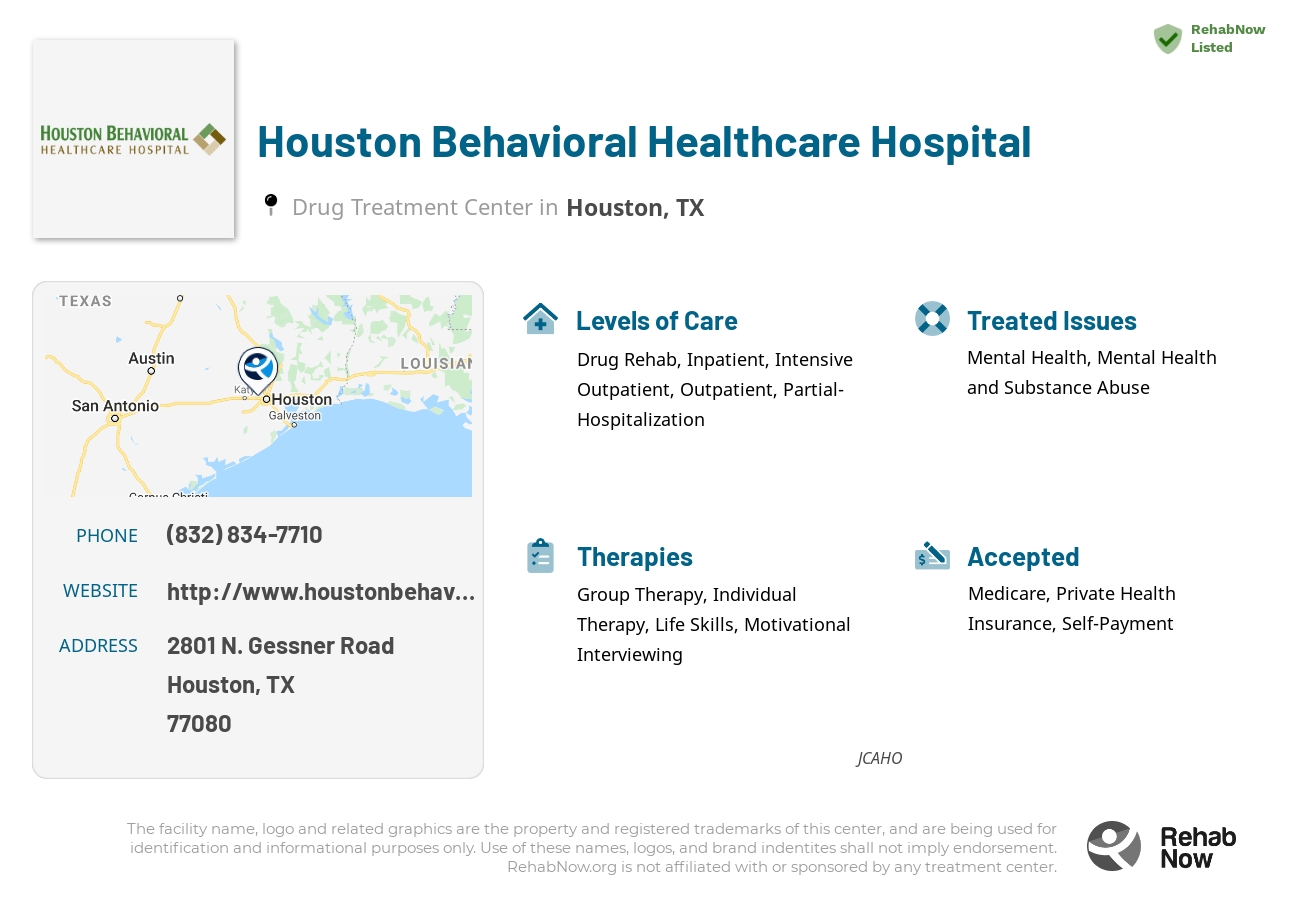
Houston Behavioral Healthcare Hospital
Drug Rehab Center in Houston, Texas
- Mental Health
- Dual Diagnosis
- Drug Addiction
Houston Behavioral Healthcare Hospital is a premier mental health and dual diagnosis treatment center in Houston, TX which provides comprehensive evidence-based approaches to treat clients, is accredited by JCAHO, and accepts private insurance.
About Houston Behavioral Healthcare Hospital in Texas
Houston Behavioral Healthcare Hospital in Houston, Texas, stands out for its mental and behavioral health care services specifically tailored for adults and adolescents facing the intertwined challenges of substance use and mental health disorders. Its approach emphasizes individualized care, integrating intensive outpatient and partial hospitalization programs for those in need of rigorous drug rehab treatment. Highlighting its commitment to quality and compassionate care, the hospital creates a supportive environment fostering positive life transformations.
- Specialized Dual-Diagnosis Programs: Catering to individuals with co-occurring substance use and mental health disorders, offering them a targeted path to recovery.
- Variety of Treatment Intensities: From intensive outpatient to partial hospitalization programs, treatments are tailored to meet varying levels of addiction severity.
- Wide Insurance Acceptance: Accepts a broad range of insurance providers, making treatments accessible to a larger community.
Accredited by the Joint Commission on Accreditation of Healthcare Organizations (JCAHO), Houston Behavioral Healthcare Hospital exemplifies excellence through its evidence-based, comprehensive approaches to addiction and mental health treatment. Its specialized programs and services are designed to address the unique challenges faced by those with co-occurring disorders, ensuring that clients receive the level of care they need for effective recovery.
The hospital tackles a broad spectrum of addictions and related mental health issues, providing customized treatment plans that blend individual and group therapies. Through its intensive outpatient and partial hospitalization programs, it offers a continuum of care that supports individuals at every step of their journey towards sobriety and mental wellness.
Genders
Ages
Modality
Additional
Accreditations

JCAHO
Conditions and Issues Treated
Levels of Care Offered
This center offers a variety of custom treatment tailored to individual recovery. Currently available are Drug Rehab, Inpatient, Intensive Outpatient, Outpatient, Partial-Hospitalization, with additional therapies available as listed below.
Individuals who are suffering from severe addiction or have a high risk for dangerous health concerns are often recommended to receive inpatient treatment.
Choosing to enter an inpatient treatment program is beneficial for people who are suffering from severe addiction, or who have a high risk for dangerous health concerns.
Inpatient treatment is beneficial for:
- People who have a history of severe withdrawal.
- People who have attempted to overcome addiction on their own without success.
- People who have a history of relapse, or have recently relapsed.
- People at risk for drug overdose or withdrawal-related complications.
- People with medical conditions that are worsened by drug or alcohol use.
Addicts who need help with their addiction can enroll in an intensive outpatient program (IOP). But the patient won’t live there during treatment.
IOP involves patients visiting a medical office building regularly for therapy and other services while continuing to live their lives.
IOP is a step up from drug or alcohol detox, but it’s still a phase of recovery, not the end goal. Patients in need of IOP have many options for rehab and treatment.
Outpatient treatment is considered the lower intensity level of addiction treatment. It’s ideal for early phase addiction or lower intensity addictions. It may include weekly sessions instead of daily. It may include weekly sessions instead of daily. Peer group support, 12-step programs, and individual counseling may still be involved but at a lesser frequency than an intensive outpatient program. It is a good choice for someone who doesn’t need to go through a medically supervised detox and who has a supportive home environment. It requires motivation and dedication to commit to the program without constant monitoring.
PHP is a program where the individual is cared for in a hospital-like environment during the struggle of those symptoms, but still have some of the freedoms of an outpatient form of treatment. The individual may sleep at the facility each night, or they may sleep at home, but all have more monitoring than an outpatient treatment program typically offers. A PHP is able to live at home, attend school, work or perform other daily activities. This appeals to many families due to the ability of their loved one to still have some freedoms while also receiving treatment for their addiction.
Therapies & Programs
Individual therapy involves one-on-one sessions between the patient and therapist. It provides patients with a safe environment to openly discuss personal and sensitive issues with the therapist. They find the therapist as someone they can trust. Individual therapy aims to identify the core issues that would have led the patient to substance abuse and address them effectively. The therapist can develop patient-specific customized solutions through individual therapy, which aids speedier recovery.
Groups typically involve meetings with other recovering addicts who can relate to one another’s experiences. They might meet in person or online and typically focus on the process of staying sober rather than overcoming a specific addiction.
In these groups managed by Houston Behavioral Healthcare Hospital, addicts can build a sense of community and develop strong emotional connections with others who understand what they are going through. These beneficial relationships can help addicts overcome their cravings and prevent relapse at any point during the recovery process.
Since addiction is a chronic physical and mental illness, addicts need to learn as many life skills as possible. Many drug treatment centers offer life skills activities as part of their addiction recovery programs. Examples include cooking classes, employment training, resume writing seminars, parenting classes, and computer training. Life skills activities help addicts find employment, take care of their families, and give back to the community.
Payment Options Accepted
For specific insurance or payment methods please contact us.
Is your insurance accepted?
Ask an expert, call (888) 674-0062
Additional Details
Specifics, location, and helpful extra information.
Houston, Texas 77080 Phone Number(832) 834-7710 Meta DetailsUpdated April 15, 2024
Staff Verified
Houston Behavioral Healthcare Hospital Patient Reviews
There are no reviews yet. Be the first one to write one.
Houston, Texas Addiction Information
Texas is one of the primary hubs for drug smuggling into the country. The border between Texas and Mexico is more than 1,000 miles long. More than 10 million residents use alcohol every year and more than 25% of those are minors. Alcohol and drug use has become so common in Texas that almost 15% of all deaths can be attributed to these substances.
Houston, TX, has a significant drug addiction problem. According to recent statistics, about 8.7% of Houston residents report using an illicit drug. Additionally, there were 849 reported overdose deaths in 2016, many of which were related to opioids. Drug addiction and abuse have a big impact on the community in Houston, Texas, as it creates crime and violence, increases health problems, and puts a strain on social services.
Treatment in Nearby Cities
- Orange, TX (110.0 mi.)
- Corsicana, TX (166.4 mi.)
- Buda, TX (138.8 mi.)
- Tulia, TX (488.2 mi.)
- Monahans, TX (453.6 mi.)
Centers near Houston Behavioral Healthcare Hospital



The facility name, logo and brand are the property and registered trademarks of Houston Behavioral Healthcare Hospital, and are being used for identification and informational purposes only. Use of these names, logos and brands shall not imply endorsement. RehabNow.org is not affiliated with or sponsored by Houston Behavioral Healthcare Hospital.



